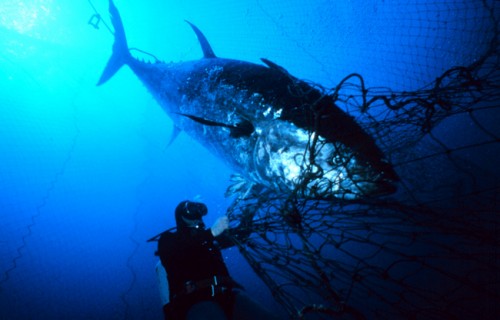 There was some hope recently that the International Commission for the Conservation of Atlantic Tunas, the organization charged with managing the Atlantic tuna fishery, would listen to its own scientists and ban commercial Atlantic bluefin tuna fishing so that the species might survive. Nope:
There was some hope recently that the International Commission for the Conservation of Atlantic Tunas, the organization charged with managing the Atlantic tuna fishery, would listen to its own scientists and ban commercial Atlantic bluefin tuna fishing so that the species might survive. Nope:
Environmentalists on Sunday warned bluefin tuna was on its way to extinction after a international meeting of fishery ministry officials trimmed catch quotas but upheld continued hauls of the fish, prized in sushi dishes.
“After meeting for 10 days, the International Commission for the Conservation of Atlantic Tunas (ICCAT) refused to end fishing for Atlantic bluefin tuna,” the Pew Environment Group, a U.S. organization that sat on in the meeting in Recife, Brazil, said in a statement.
“Instead, ICCAT set the catch limit for bluefin, considered the most valuable fish in the sea, at 13,500 tons,” it said.
…Yearly quotas set up by ICCAT are systematically exceeded by industrial fleets. That and illegal fishing have caused the population to decline by more than 85 percent in the eastern Atlantic and by more than 90 percent in the western Atlantic.
ICCAT “has failed once again to act beyond the interests of a few tuna fishing and farming industries,” Greenpeace said in a statement. “Again it has approved recommendations which fail to ensure the recovery of Atlantic bluefin tuna.”
The ICCAT has a long history of putting commercial interests ahead of the fishery. It was about this time last year that I discussed the “Tragedy of the Commons” debate regarding the bluefin tuna. So when news broke the other week that ICCAT’s scientists had called for a total ban — while others were hopeful — I was skeptical that the ICCAT as a group would follow through.
At the time, their own scientists observed that the bluefin tuna technically qualified as an endangered species, at least by international standards. And now that fact may be the only thing standing between the tuna and extinction — as Barry Estabrook pointed out, the Convention on International Trade in Endangered Species of Wild Flora and Fauna (CITES) will consider a proposal at their next meeting in March 2010 officially to list the Atlantic bluefin tuna as an endangered species and ban international trade in the fish. Of course, even that ban needn’t be permanent. Other threatened fisheries have recovered and scientists expect bluefin tuna could come back within a decade, if properly managed. At this point, however, international groups have shown no ability to “properly manage” the fishery. Keep all that in mind next time you go out for sushi.



